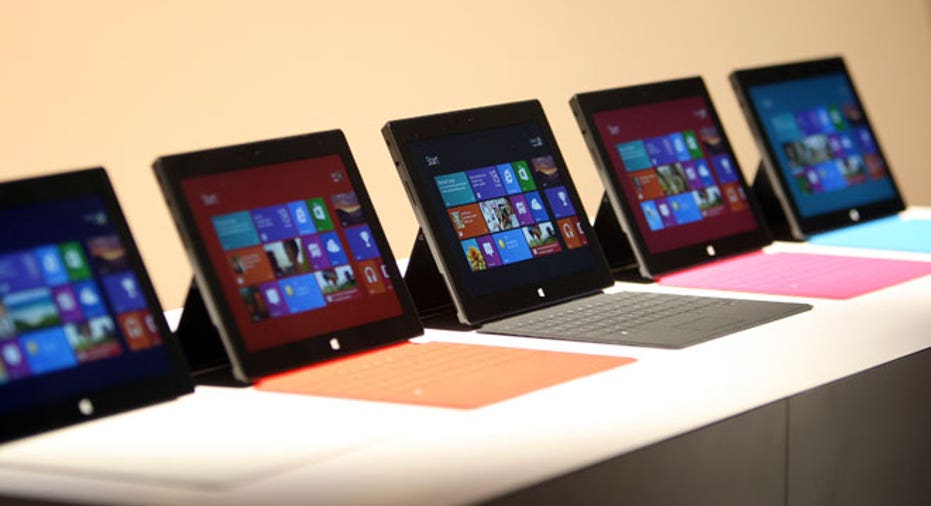The Boy Genius Report: Microsoft is Blowing it and RIM Could Too

Who would have thought a couple of years ago that Research In Motion (NASDAQ:RIMM) would be on the ropes and Microsoft (NASDAQ:MSFT) could be getting close?
Well, me… but not many others. Microsoft’s latest strategy of trying to make a no compromise tablet has resulted in, you guessed it, compromise. It’s not as polished as an iPad, it’s more limited in almost every possible way, it’s slow, clunky, unresponsive at times, offers a worse display, weighs more, and is thicker. Plus it costs over $100 more when you factor in a Touch Cover or Type Cover keyboard. Plus, you can’t even run Windows applications even though you get the actual Windows desktop.
See more tech stories on the FOX Business Technology homepage.
The best part is the Surface Pro. An even more expensive version of the Surface, an even thicker version of the Surface, and an even heavier version of the Surface, and you get a fan to cool your heating tablet when you’re doing your Excel speadsheets or when Outlook keeps freezing — oh my god why does it freeze so much when you’re typing — and you get half the battery life of the current Surface model.
There’s a very big issue with Microsoft’s strategy of no compromise, because time and time again this company fails to realize that the reason Apple (AAPL) is winning is because Apple chooses to compromise.
Apple chooses to throw out the USB port, the DVD drive, the kickstand, the fan, the Intel processor. Apple understands that laptops are still useful but at this point in the game, the only use for a multitouch laptop should be in the trackpad. Microsoft is trying to introduce the Surface Pro as your new laptop, except it doesn’t work well in a variety of situations, especially on your lap. Plus, consumers don’t care, and with enterprises and large companies (and small companies) not rushing out to buy brand new computers or brand new software licenses for their employees and workstations due to cost, and the fact that more and more employees are bringing in their own laptops and also asking for Macs, Microsoft has a tremendous problem.
Compounding Windows 8′s failure is the fact that Microsoft is still not prepared for the consumerization of the enterprise world, Microsoft’s bread and butter, and the reason why Microsoft has $60 billion in cash. As Windows licenses erode and Office sales slow, Microsoft isn’t going to have another hugely profitable business to rely on — that’s why this is so scary.
Switching to RIM, the company is actually doing a lot of things right in my book. I respect that everyone there has been huddled up, focused on a single product and operating system and put all of their time into getting it as right as they can. Whether that means anything at all, we’ll soon see; RIM has probably been one of the worst players in the mobile space as far as execution is concerned but Thorsten Heins seems to have a better grasp on where the company can take advantage in different markets and at what price point, though RIM’s market share is declining so rapidly that not even BrickBreaker can save the company there.
I have two concerns from a very high level (in-depth thoughts at a later date) about BlackBerry 10 and the devices RIM is introducing on the hardware front. First off, going with a touch only phone first sends the wrong message to me. What is RIM’s biggest strength? Some would say email, some would say security, most would say the keyboard. Introducing a brand new operating system, with a brand new smartphone that doesn’t feature RIM’s fantastic keyboard feels like a marketing blunder. If there is one single reason BlackBerry owners (yes! they do still exist) still have a BlackBerry, it’s for the keyboard.
Yes, I know, there is a QWERTY BlackBerry 10 smartphone coming just a couple of weeks or months after the first touchscreen device, but these two should have been joined at the hip at the very minimum.
My other concern is RIM is already showing a break in the company’s focus by introducing two different screen sizes from the gate. The BlackBerry L-series will have a 1280 x 768 screen resolution and the BlackBerry N-series have a 720 x 720-pixel display. In my time playing with an N-series prototype, this square resolution felt incredibly awkward and it’s now two screen sizes that RIM’s developer community has to account for when making apps. Add this to the fact that RIM has enough trouble getting developers on board — of course Microsoft is having trouble there, too — and this feels like it’s not the most optimal scenario.



















